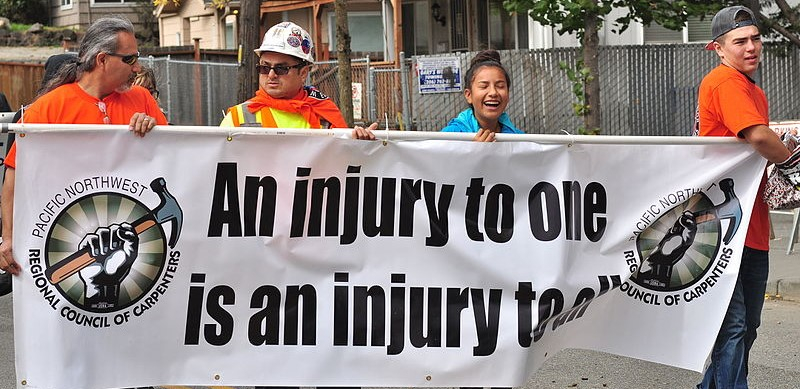Viewpoint: An Injury to the Contract Is an Injury to All

Credit: Joe Mabel, CC 2.0
Viewpoints
Introduction: How Should Unions Deal With Free Riders?
Chris Brooks: Don’t Fall for the Members-Only Unionism Trap
Steve Downs: Don't Rule Out Giving Up Exclusive Representation
Jonathan Kissam: Unions Are Class Organizations, and Should Act Like It
Marian Swerdlow: To Thrive after Janus, Deeper Changes Are Needed
Bruce Nissen: How One Union’s Image Got an Upgrade
Joe Burns: Making the Union a Personal Choice Gives Ground to the Boss
Editor’s note: The Janus v. AFSCME Supreme Court case that is likely to establish right-to-work as the law of the land for all public sector unions. In anticipation, New York recently altered the state’s public sector labor law so that public sector unions no longer have to provide representation to non-members in disciplinary hearings, grievances, or arbitrations. The move was backed by the state’s unions. Les Caulford, former president of Steelworkers Local 1900 in South Lyon, Michigan and a longtime friend of Labor Notes, weighs into the broader discussion of post-Janus strategy with his own thoughts on attempts by unions to not represent or provide services to non-members.
I was elected the grievance chair of Steelworkers Local 1900 in South Lyon, Michigan in 1992 and held that position until the Quanex steel plant I worked at closed ten years later. Over that time I also served in other various positions, such as local president and chair of the health and safety committee.
Based on my personal experiences, I think it is a mistake for unions to support legislation like what passed in New York because it undermines union contracts and diminishes solidarity among working people.
Defend the Principle, Not Individuals
Unions win a contract that provides employees with certain rights. Unions have no control over who the company hires. What we try to control is the power that management exercises over us every day on the job through our union contract.
If the company violates the contract, then the violation is against the bargaining unit. The issue is not whether the violation was against a union member or a non-member, but whether management violated the agreement. If they did, then the union should process the grievance.
It strengthens our bargaining unit to represent non-members by keeping the contract in force. You have to take the contract as a serious document and you can’t cherry pick what you want to fight for and what you don’t want to fight for.
If there is a battle with management, we have to fight it. If we don’t then everyone will likely suffer.
It doesn’t even have to be a battle over the contract to hurt us.

SUPPORT LABOR NOTES
BECOME A MONTHLY DONOR
Give $10 a month or more and get our "Fight the Boss, Build the Union" T-shirt.
Let’s say an employee violates a particular work rule and is reprimanded by management by being suspended from the job for one month. The union could argue that the one-month suspension is too severe because no individual worker that violated that particular work rule ever got more than three days off before then. The union could file a grievance and ask for information on every employee that ever violated that work rule. If that information shows that no employee ever got a month off, then the union could prove a past practice which reinforces that the discipline was too harsh.
Now imagine that the worker in question was not a member and the union doesn’t represent them. They get a one-month suspension that establishes a new practice and sets a new precedent. If another worker receives the same punishment, and this time they are a union member, an arbitrator will say that the union gave up the right to defend themselves on that issue due to past practices.
Past practices are just as strong as a written contract. Not defending those practices could harm the whole bargaining unit.
Diminishes Solidarity
Right-to-work is not just an attack on unions, it’s another attempt to divide working people. Who wins when we pit workers against workers? Management.
My experience has always been in a union security state. I’ve never worked in a right-to-work state or shop (Editor’s note: Michigan went right to work in 2013, after the author retired).
But I’ve had members who, due to religious reasons or whatever, only paid agency fees. And we represented them, too. I’ve seen members who didn’t feel strongly about the union one way or another who became better members after seeing the union fight for them.
In every union I was a part of, there were people we represented who didn’t support the union. But what I found was that if the union was strong and we did a good job fighting management and lifting standards for everyone, then most people followed us.
The duty of fair representation is not mentioned in federal labor law, but the NLRB and courts have said it comes from a union being the exclusive bargaining agent for a group of workers. If we get rid of the duty of fair representation, we might lose exclusive representation, opening workplaces up to competition between multiple unions.
We should be working towards keeping bargaining units intact, not splitting them up. Our strength is in our numbers.
Representing everyone is one of the challenges facing unions and it’s a challenge we need to rise to meet.
Our motto should not be an injury to a non-union member is not an injury to union members. Our motto is an injury to one is an injury to all. Period.




